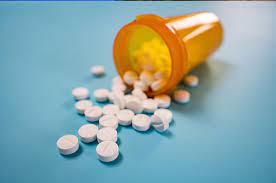The rate of drug abuse in Nigeria, particularly among the youths is assuming an alarming dimension.
A recent data released by the National Drug Law Enforcement Agency (NDLEA), showed that over 20 million Nigerians are involved in drug abuse out of which 60 per cent are youths.
Mostly involved are youths in higher institutions and in the entertainment sector.
Dr Obi Adagwu, an expert on drug control, explained that the resurgence of drug use among the youths is due to poor enforcement and inadequate policy to curtail it.
“How many drug rehabilitation centres exist in the country? The few we have, how effective are they?’’
He said the war against drug abuse should start from homes, as most parents who are supposed to be mentors do not monitor their children.
“Some parents do not even know at what point their children got involved with drugs.
“The fight against drug abuse should also be taken to government offices, there are so many government officials abusing drugs,’’ he added.
Adagwu who is a psychologist, also blamed the government for not giving sufficient support to agencies with the mandate to check drug abuse.
NDLEA spokesman, Femi Babafemi, who spoke on the efforts of the agency to tackle drug abuse, said that over 400 suspects and large quantities of drugs were intercepted in the past few months by officials of the agency from various routes, including airports.
According to him, over 200 cases are at various stages of prosecution.
“ We solicit media support and other Nigerians to give information to the agency, no effort shall be spared to rid the country of illicit drugs, ‘’he added.
Mr. James Ojomo, an expert in drug abuse, says many of the major towns including Kano, Kaduna, Abuja and Lagos are veritable grounds for drug abusers.
“ For some time, the country was not serious in waging war against drug abuse, as we were treating it with kid grooves.
“Illicit drug users and its barons were having a field day, turning the country into a destination route rather than a transit.
“With the ongoing restructuring of NDLEA, and a new henchman in the person of Buba Marwa, the agency has been rejuvenated and the war has just begun,’’ he said.
Ojomo says that what is expected from the rest of us is to give information and expose barons amongst us that are threatening to destroy our youths and the future of the country.
Some concerned Nigerians say that over the years, successive regimes in Nigeria had taken steps to improve the country’s reputation as an international drug trafficking centre.
According to them, most of the emphasis had fallen on law enforcement and repression, resulting in a sharp increase in the number of arrests and prison population.
In spite of such severe measures, experts say a correlative fall in drug consumption has not been witnessed.
They added that with the renewed effort by the NDLEA and support from the Federal Government, the war against drug abuse will be tackled and won in no distant time.
They also stressed the need to strengthen the law against drug use.
Professor Isiodore Obot, the Director, Centre for Research and Information on Substance Abuse, said that Nigeria had failed in its drug war, considering the large number of youths involved in drug usage and abuse.
Obot, who spoke at the Youthrise Nigeria Drug Policy Training for media practitioners recently in Abuja, said in spite criminalising drug use for many years, this had not achieved its goal of eliminating drug production and use.
According to him, the nation’s perspective about drugs from a criminal justice system perspective needs to be changed to healthcare system perspective.
Obot, who is also a psychologist, declared that drug use was much more than a criminal issue, but one with many health and social implications, including fighting, violence, among others.
He said drug use cuts across all social classes and gender, adding that what may be different is what type of drug they are using.
He listed illegal drugs commonly used as cannabis sativa, cocaine, heroin, amphetamine-type stimulants and inhalants and solvents such as glue.
Professor Mojisola Adeyeye, the Director-General, National Agency for Food and Drug Administration and Control (NAFDAC), attributed the high rate of drug abuse to lack of control of prescribed drugs, among others.
Adeyeye who spoke at an event to mark the 2020 International Drug Awareness Day in Abuja, said other factors responsible for drug abuse are the love for money by peddlers, unemployment, disobedience to the laws of the land.
Other reasons she identified as responsible for drug abuse are smuggling substances through our porous seaports and land borders, corruption and light penalties for the sellers and traffickers.
According to her, the only way to check abuse is for the government to develop and enforce a National Prescription Policy.
Adeyeye appealed to the three arms of government not to relent on its efforts in the fight against drug abuse, stressing that they have a major role to play by putting in place, stiffer penalties, that are commensurate with the offences of drug abuse.
She called on ministries, departments and agencies, religious bodies, educational institutions and parents to join hands with government in the fight against drug abuse.
While identifying drugs like tramadol and codeine as the most commonly abused drugs in the country, the NAFDAC D-G had this to say: “Tramadol is a synthetic analgesic used to treat moderate to severe pains and is the most abused medicine among addicts.
“Tramadol and codeine are regulated as 50mg and 100mg dosage strengths, but very high dosage forms of 200mg and 225 mg have infiltrated the market,” she added.
She advised youths in the country to desist from drug abuse as it portends very high risks such as arrhythmias, cramps, coma, and death.
“We need to rescue our youths from the use of illicit drugs, to achieve this, all hands must be on deck, relevant agencies must work together,’’ she emphasised.

